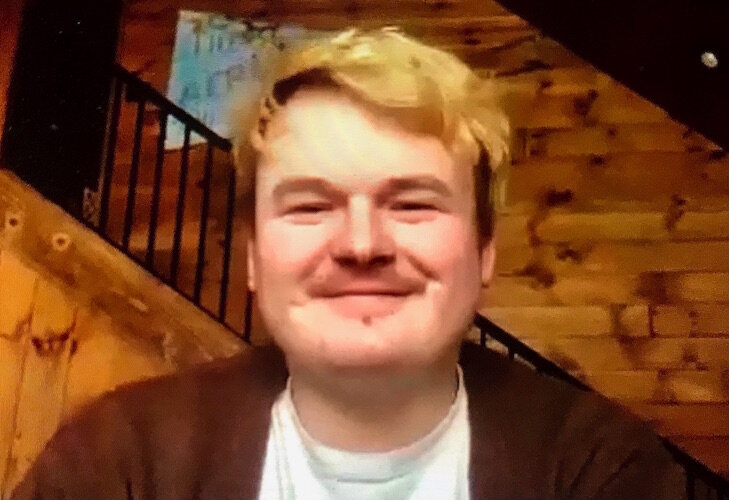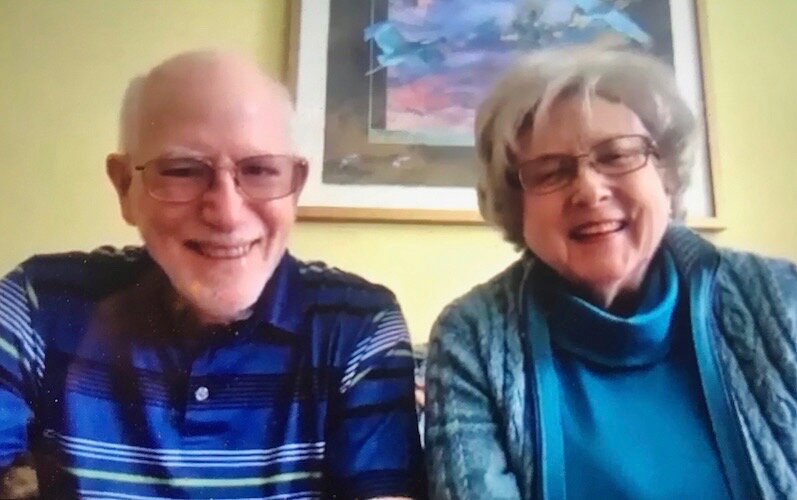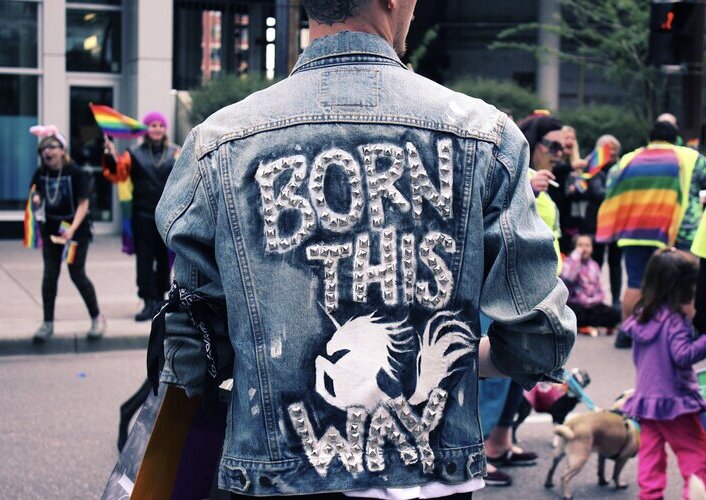OutFront Kalamazoo’s Host Home program designed to help LGBTQ youth avoid homelessness
When young people are kicked out of their homes after they come out to their parents they are vulnerable to many traumatic experiences. OutFront Kalamazoo's Host Homes program is designed to help them.
Editor’s note: This story is part of Southwest Michigan Second Wave’s On the Ground Kalamazoo series.
When people tell the world they’re gay, lesbian, bisexual, transexual, or queer, the world isn’t always ready to hear it.
That includes mom, dad, and their family members, says Hunter Willard, director of Homeless Youth Programs for OutFront Kalamazoo.
For young people who are still living with their parents or family members, coming out can be a volatile situation in which they are told to leave or are made so uncomfortable they feel they have to leave, says Willard.
“A lot of the times they don’t even have a choice,” Willard says. “Sometimes the kids want to stay in their homes but their families don’t really give them a choice in terms of maybe kicking them out.”
To help young people who find themselves in that situation, OutFront Kalamazoo has launched its Host Homes program, an initiative to find supportive volunteer homes in the area to address the needs of LGBTQ+ youth (ages 13 to 24) who are faced with homelessness.
OutFront provides case management services and helps connect young people with adults who are willing to provide safe housing and support. OutFront, formerly known as the Kalamazoo Gay and Lesbian Resources Center, is a not-for-profit charitable organization that has worked for more than 30 years “to advance social justice, change hearts and open minds so that all people in southwest Michigan can live authentically and free from discrimination regardless of their gender identity or sexual orientation.” It works in partnership with CARES (Community AIDS Resource Education Services).

The Host Home program is intended to provide temporary shelter (up to six months) and care for young people while attempts are made to help them reconcile relationships with their family of origin.
“We want to garner a base of potential host families so that the kids, the people who are in need of our help, have the ability to pick who would be the best fit for them while we figure out their situations at the time,” Willard says.
Host Homes is a program that Sara Jacobs learned about in 2017 and is happy to see implemented now. The program is modeled after similar programs in other cities. It was launched in November but has been slowed down, like many other programs, by concerns about the spread of the COVID-19 virus. Willard has been looking to recruit responsible, suitable families to host young people who need support.
Jacobs, who was director of OutProud Safe, a predecessor program that worked to end homelessness among LGBTQ youth, tells the story of two high schoolers who were forced to leave their family homes a few years ago.
“One was a junior in high school who had a 4.0+ grade point average and was on track to be an astrophysicist,” says Jacobs, who is now director of the Kalamazoo County Continuum of Care. “That sounds like the dream — a super-great kid, very polite, really easy to talk to and be around, willing to work hard, and did.”
But she says the teen was forced to leave home at the end of his junior year after telling family members that he identified as a female. OutProud Safe then worked to help her find services and permanent housing.
“Usually when people come out, it’s denial to themselves, and then they have to work through it and accept it themselves,” Jacobs says. “And then they start vocalizing it to friends and eventually family. So anytime that happens, they’ve been thinking about it for years. Oftentimes, parents hear about it and at that point, youths are like, ‘Hey, I’m ready to assert who I am because I’ve been thinking about it for years.’ For parents, it’s brand new. So their initial thought is kind of like: ‘Don’t talk about it. Don’t think about it. I don’t want to hear about it.’ So they are denying that space to a person.”
She says there’s research that correlates the trauma experienced in the LGBTQ community with suicides and drug use “and a lot of that comes from not being in a space where they can express who they are and be themselves.”
Homeless LGBTQ youths also find themselves at a high risk of being discriminated against, sex trafficked, and abused, Willard says.
For those who face rejection from loved ones, Willard says, “I can imagine that they are lost and that they’re scared and they are unsure of what the next day is going to bring them. They don’t know where they’re going to get their food. They don’t know how they are going to get to school. Maybe they have medical needs that need to be met and they don’t know how that’s going to pan out anymore.”
Many times, LGBTQ youths “find themselves homeless based on their identity – whether it be their gender identity or their sexual orientation,” Willard says.
Asked how that happens, the youth programs director says, “Either the family is not on board for various reasons, but more often than not, there are religious reasons. They’re not on board (with their child’s sexual orientation) and they say, ‘Get out of my house and we don’t want contact with you.’ Kind of like a not-under-my-roof situation. Or they (the family) make their living situation intolerable, where the individual feels like they have no choice but to leave.”
The goal with Host Homes is family reconciliation, Willard says, “And this is why we’re partnering with the OutFront Faith Alliance and kind of relying on the faith community because a big reason that these LGBTQ youths are ostracized is based on religious beliefs.”
Members of the faith community are set to try to help young people and their families reconcile their relationships. The program is enlisting religious leaders to discuss matters with families and help them come to an understanding of their child.
Whether a family believes in who their child is, or accepts who they love, the mission is to help them understand “that it’s still the best thing to do right by your child and love them regardless,” Willard says.
The OutFront Kalamazoo Faith Alliance is a collective of concerned community leaders that seeks “inclusion of and justice for gay, lesbian, bisexual and transgender persons at all levels of public and religious life,” according to OutFront. It includes leaders from 14 local churches including People’s Church, Portage Community Church, Temple B’Nai Israel, First Congregational Church, First Presbyterian Church, and First United Methodist Church.
Members of one of the alliance churches, Gary and Sheila Bigelow of Portage Chapel Hill United Methodist Church, are the first family to volunteer to be a host family. The Bigelows remember a night in the early 1990s when they were in bed and their 17-year-old daughter stuck her head in the bedroom door to say, “I think I’m gay. Good night.”

Sheila Bigelow wonders how parents can kick a child out of their home. But she remembers being challenged to consider her own attitudes about homosexuality many years ago, and after her daughter’s good night announcement, she remembers wrongly suggesting that her daughter hold off on coming out.
“I think I was guilty of saying, ‘We’re fine (about it). But I wouldn’t necessarily come out to your friends,’” Sheila Bigelow says. “She was going through her senior year of high school. And I said, ‘You know, next year, you’re going to go someplace. You’re going to make your own life. Sooo …’”
She now knows that was not something to suggest to someone who had probably been holding themselves back for a long time. She says her daughter’s friends and other family members were absolutely fine with the knowledge.
“No youth should be homeless in an ideal world, especially when we have young people who are homeless because they’re trying to be their authentic selves,” Sheila Bigelow says in an online posting. “We know that by the time youth come out to their parents, they’ve been thinking about this for a long time. And if this is something that the parents reject – sometimes parents just need time to get used to it.”
Gary Bigelow says, “We see a need and we like to feel useful and we think that we can be useful in this context.”
The pair think they can provide a place where young people can be safe, finish school or explore life. “And if faith has been an issue, as it so often is with LGBTQ youth, we’re in a position to discuss that with them,” Sheila Bigelow says.
She is a retired English teacher and child care provider. He is retired from Western Michigan University after teaching Spanish. They are well versed in the Bible and stand ready to discuss scripture as it relates to love and acceptance, as well as homosexuality.
“The need for Host Homes is that with being young and LGBTQ and experiencing homeless on top of that, these kids are in some of the most vulnerable communities,” Willard says. “They are more likely to be trafficked, more likely to have to participate in survival sex work, and many of them are garnering trauma while, at the same time, being homeless can be very detrimental to a person’s life even after the point that they are able to garner some shelter.”
More information about the program is available by contacting Willard at hunter@outfrontkzoo.org or 616-835-8092.
Expanding the LGBTQ experience
Programs like Host Homes cannot be offered without financial support.
Kalamazoo County Continuum of Care’s Director Jacobs asked for people to support OutFront, which puts on a Pride event each year in Kalamazoo. That event, which has brought hundreds of people to downtown Kalamazoo’s Arcadia Festival Place each year, is the organization’s biggest annual fund-raiser, she says. It has been the second-largest annual Pride event in the state, following one held each year in Detroit.
But the in-person celebration was canceled last year and is being celebrated primarily online this year as efforts continue to prevent the spread of COVID-19. Jacobs suggests that people make a contribution to OutFront.
“If you’re going to support pride in any way, that would be really great — if people would send money to support that organization,” Jacobs says.
That would help ensure that programs like Host Homes continue, “So that work could still be done,” she says.

Reading of the LGBTQ experience
The Bigelows’ daughter, Lisa Jenn Bigelow, works as a librarian in Illinois and is also the award-winning writer of three fiction novels that feature young people in the LGBTQ community. They include:
Starting from Here – Written in 2012 and published by Amazon Children’s Publishing, it is the story of a fictitious 16-year-old girl whose mother has died, whose father is a long-haul truck driver, and whose girlfriend dumped her for a guy.
Drum Roll Please – The novel geared toward middle school readers has been described as a tale about finding the confidence to rock out to your own beat. Published in 2018 by Harper Collins Children’s Books, it was one of Time Out’s LGBTQ+ books for kids during Pride Month in 2018, and it was an Illinois Reads selection and a Michigan Notable Book.
Hazel’s Theory of Evolution — Written in 2019 and published in 2018 by Harper Collins Children’s Books, it has been described as a heartfelt novel of family, friends, and change. It is the story of a 13-year-old girl who feels left behind by her best friend, and who has two mothers, one of whom is pregnant after suffering more than one miscarriage. It was a winner of the 2020 Lambda Literary Award in the young adult category.
















